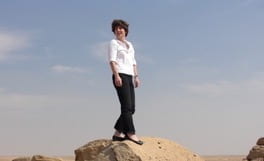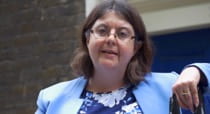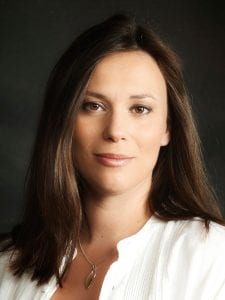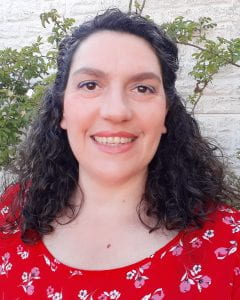Here, you will get an insight into UCL Faculty’s areas of expertise as well as their advice on how we can take our passions in psychology and education further!

This week’s interview is with Dr. Liory Fern-Pollak, Senior Teaching Fellow at the IOE.
Q: How did you end up in your career?
I grew up in Israel and there’s mandatory military service there, so I came to study a little bit later than everyone else. I started when I was about 21, and I studied at UCL, but I didn’t do psychology, I did biology. And I always thought that the psychology students, who were just in the building next door, were so cool. I should have studied psychology, but I didn’t. So when I finished biology, I went to do a master’s and I thought, I have to do something that’s related to the brain, to kind of go more into psychology. I did a master’s in cognitive neuroscience, which was biological, but it was also kind of a bit more psychology-based. And that really got me into liking the link between the brain and behavior, reading between biology and psychology. Then, I was offered a scholarship at Brunel University to do a Ph.D. So I took it. And then that’s when I did my Ph.D. in neurolinguistics.
Fun fact: At the time, the university had only just acquired an MRI scanner when nobody knew how to use it. So, I was so lucky because I got to learn how to use it and I could use it pretty much whenever I wanted. There was one time when I was a postdoc already and I was the technician at the MRI, but the engineer who usually is there and is supporting all the scanning was on leave. Because I had done so much scanning, I had a certification and I was allowed to operate the scanner by myself. So it was just me and it and a Ph.D. student, and we were scanning and we broke it! There was a participant in the scanner and we pressed a lever to get the bed to slide into the scanner. I didn’t know this was really stupid, that you just need to press once and then it just goes in automatically. So I just kept pressing, and it went and it hit the back of the scanner and it stopped working!
Q: It seems that you initially began studying biology and then you ended up specialising in linguistics and neuroscience, so you didn’t always know that you wanted to end up in psychology, right?
No, it was very much that a lot of the choices I made were made by default because I was good at biology. I thought, OK, I’ll do an A-level in biology, and then because I did really well, I thought, OK, I’ll study biology at university because all I wanted to do was study in London. I didn’t care what I was going to study, I was like, just let me live in London because London is amazing. Then while doing biology, I realized that the whole aspect of the nervous system in the brain was so much more interesting to me than zoology, botany or genetics. The master’s program that I did had two streams, and it was at Imperial College. So it was a neuroscience program and then in the second term, we had to choose whether we wanted to go through the biology route or the cognitive route. Then, the people like me who decided to go the cognitive route went to do experiments on humans. I found that that made me sleep better at night because I really struggled with experiments on animals, even though in this country it’s very controlled and there’s a lot of ethical guidelines, I still thought I can’t do experiments on animals, so why not experiment on humans? I was really lucky because then the supervisor that I chose to do my master’s with was incredible. Thanks to him, I got a publication, out of my master’s, which is really rare. Finally, because I’m trilingual, I always thought it would be really interesting to use my languages somehow. So for my Ph.D., my supervisor was amazing, and together we came up with the research question. I didn’t think that I was going to be looking at neurolinguistics, it just so happened that my professor was one of the first people who discovered monolingual dyslexia in bilingual people.
Q: Do you have any tips on finding supervisors?
At the time, Google was very limited, but now it’s so much easier because you can find anything online and there are so many research seminars that are being streamed and recorded. So, I think my biggest tip to anyone who is looking for supervisors is: the topic is secondary and the actual relationship with a supervisor is the most important because you have to work very closely with that person. You kind of need to get the feel of are you going to be able to work with this person? Are they going to take over and control everything you do, or are they going to leave you to your own devices, which means you don’t know what you’re doing? So you need to kind of find a good balance of guidance and autonomy.
Q: What are your main areas of research and your research interests?
My path of expertise is understanding how people read in different languages and what happens when people have reading difficulty in different languages. My Ph.D. and postdoc were about looking at bilinguals and trilingual languages of different orthographic transparency levels. Usually when I supervise master’s and Ph.D. students they are all studying the processes of reading or some kind of linguistic processing that has to do with bilingualism or multilingualism. So I’m really interested in understanding how people who speak different languages process the language and what other implications being bilingual or being multilingual might have on your wider abilities.
Q: What are your top tips for students struggling with uncertainty about their careers and futures?
The first thing I should say is you’re not alone. I think very few people have a very certain path. And sometimes people who have a very certain path later suddenly discover that, actually, that’s not what they really want. I think uncertainty leads to open-mindedness and adventures. And I think you have to always keep an open mind because there are so many surprises in life. It can be very stressful if you’re the kind of person who likes to have everything planned out and know exactly how things are going to go. To those people, I would say really, really try to focus on the positive aspect of the uncertainty and remember that it can bring you lots of surprises, lots of good surprises.
Q: Would you like to share some things about yourself outside of your profession, such as your hobbies and interests?
I love reading. I love reading in all the languages that I know because I think it opens my mind as well. Knowing Spanish opened my horizons to learning about Mexican, South American, and Spanish cultures.
Q: Do you have any fun facts about yourself you’d like to share with us?
There were times when if we have any social situations where you have to tell two lies and one truth about yourself, one of the things I say is that I was in the army and nobody ever believes me when I say I was a sergeant.
Q: If you could tell your 20-year-old self one piece of advice, what would it be?
Stay at UCL. I think you guys are very lucky. Well, you got in because you’re smart, but I think UCL is a great place to be both as a student and as a member of staff. I’ve been to a lot of universities and they’re all good, but UCL to me feels like home.
This week’s interview is with Prof. Eirini Flouri, Professor of Developmental Psychology.

Q: How did you end up in your career?
I have always found school easy and I have always been curious. I have had a sense of purpose since I was very young, and all I ever wanted was to be left alone to find out how things in general work. I do not mind being alone, in fact I think it suits me better than any other state of being.
Q: What are your research interests?
Developmental psychology. I am mainly interested in understanding the causes of children’s emotional and behavioural problems. Complementing my previous work on the role of family (parenting, parental mental illness and poverty) and the broader context (neighbourhood and school), my current research starts to explore the role of biological factors, such as inflammation, in the development of emotional and behavioural problems in childhood.
Q: How is your research relevant to the current pandemic situation we are facing?
Some children do better than others when under the same difficult situation. Trying to understand why is what I do for a living. It is important, and valuable, to understand why some people struggle less in the pandemic, so as to try and help those who struggle more.
Q: Would you like to share some things about yourself outside of your profession, such as your hobbies and interests?
I am very regimented. I like things tidy and clear, thoughts also. It relaxes me. I believe in pushing yourself physically, outside your comfort zone. It is good for the brain, people think only good abs, not true. Benefits transcend. Running, which I do every morning, has never failed to hurt, and has never failed to make me feel and think better afterwards.
Q: Have any fun facts about yourself you’d like to share with us?
I have been the inspiration for a theatre play, I was the main character.
15 June 2020
This week’s interview is with Prof. Julie Dockrell, Professor of Psychology and Special Needs. She is also a qualified education and clinical psychologist. She has worked in academia for many years and most recently, as a psychologist for children with language and communication difficulties.

Q: How did you end up in your career?
I went to Stirling University and they had a very interesting modular system. My plan was to major in Biology but I took psychology up as a minor subject to find out what my parents did for a living. I found it much more challenging so did my honours degree in psychology and went straight on to do a PhD. Everything else sort of followed but I often needed to re-focus because the jobs/opportunities weren’t there.
Q: What are your research interests?
My main focus is on barriers to children’s learning – both within the child and in the wider school/community. I have a particular interest in language and communication challenges and capturing how to profile the children’s learning needs. Of course, once you find a need, you need to find an intervention!
Q: How is your research relevant to the current pandemic situation we are facing?
Many of the children I work with come from areas of significant social disadvantage. They will be particularly effected by the current nursery/ school closures. It will be critical to develop the most effective and efficient pedagogy to support their future needs.
Q: Would you like to share some things about yourself outside of your profession, such as your hobbies and interests?
I am learning Italian – quite a slow process but very enlightening. I have cycled to work in London for over 20 years.
Q: Have any fun facts about yourself you’d like to share with us?
I like horseback riding and rode in South Africa in January and swam with the horses. I have tried to ride bareback – the horse went but I didn’t! My picture is from when I was working in Egypt on our Masters program in special and inclusive education.
8 June 2020
This week’s interview is with Dr. Amelia Roberts, a Principal Teaching Fellow and Deputy Director of the UCL Centre for Inclusive Education. Amelia has worked with the Department for Education on a number of projects, including co-writing two reports for Whole School SEND and is currently an Inclusion Expert for the Standards and Testing Agency. She has spoken recently on Sky News, BBC South East today and BBC Radio. As part of her UCL role, she regularly visits the Falkland Islands and has worked with UNICEF in the Sultanate of Oman on an ‘Inclusive Classrooms’ project and an inclusive education project evaluation in Moldova with JK Rowling’s charity ‘The Lumos Foundation’.

Q: How did you end up in your career?
It took a long time to get here! After I finished my PhD in 2010, I was involved with Dyslexia Action, researching a professional development framework for teachers and school leaders to support children with literacy difficulties. I then worked at the University of Roehampton, teaching the National Award for SENCOs and leading a PG Cert in Autism. I then moved to the Institute of Education in 2014 and am now the Deputy Director of UCL Centre for Inclusive Education.
Q: What are your research interests?
I am interested in Knowledge Exchange, whereby researchers and educational professionals co-construct research. One of our KE programmes is ‘Supporting Wellbeing, Emotional Resilience and Learning’, another focus is Autism and Lesson Study. I am also interested in promoting inclusive education and reducing pupil exclusions from school. I am currently involved in the research project “Wellbeing and Behaviour: Identifying interventions for positive participation for young people at risk of exclusion in school in order to reduce adverse long-term societal impact”. (Link to her paper here).
Q: How is your research relevant to the current pandemic situation we are facing?
The team and I will be reworking our Knowledge Exchange programme to offer a ‘Back on Track’ series to support teachers to support young people with special educational needs make the transition back to school. We are also releasing frequent updates to the following two resources to support parents with home-schooling children with special educational needs on our Facebook page and department website.
Q: Would you like to share some things about yourself outside of your profession, such as your hobbies and interests?
I have lived abroad in Hong Kong, Saudi Arabia and South Africa. I once lived on a boat for 18 months!
Q: Have any fun facts about yourself you’d like to share with us?
I am passionate about nature and animals and I am a vegan.
1 June 2020
This week’s interview is with Dr. Jo Van Herwegen, an Associate Professor in Developmental Psychology.
Q: How did you end up in your career?
I first got a BA and MA in Linguistics from the university of Antwerp in Belgium. During my MA I started a dissertation on language development in Williams syndrome, a rare genetic disorder. At the time it was thought that people with Williams syndrome show us that language can develop independently from overall cognition and provide evidence for modularity of the brain. During my MA, I wrote an email to Prof Annette Karmiloff-Smith, who was an expert in this field, and she invited me to come to London for a research visit. The research visit turned into a paid research assistant post and I then completed a MSc in cognitive neuropsychology at Birkbeck College London and after a few more research assistant posts (including one with Prof. Julie Dockrell) I completed my PhD at King’s College London.
Q: What are your research interests?
As a result of my broad training, my research interests are very diverse ranging including language development, mathematical development, and sensory processing to neuroscience for education, especially for children with SEN. Basically in my research, I am interested what we can learn from atypical populations about development in typical populations and how we can translate basic research to educational practice. I use a wide range of quantitative and qualitative methodologies including eye tracking methods, surveys, experimental designs, standardised assessments and randomised control trials.
Q: How is your research relevant to the current pandemic situation we are facing?
I am involved in two projects that examine the impact of COVID19 for parents.
- One is a very large international collaboration that examines the impact of COVID19 for families of children with special needs. Over 2500 families thus far from over 15 countries have completed the survey so far. We are still recruiting at the moment so for more information see https://www.specialneedscovid.org/
- The other study I am working on aims to obtain a better understanding of the impact of distance learning through technology, and parent-supported home schooling for mathematics learning for children aged 5-14 years, as we feel the existing gaps between maths and literacy may be exacerbated by the current context. In order to moderate the ongoing impact of this, we need to gain a clearer insight into the home-learning in which parents and pupils are able to engage, and support the development of best practice initiatives for educators. If anyone with children aged 5 to 14 years old would like to take part in the study, they can find more information here: https://uclioe.eu.qualtrics.com/jfe/form/SV_6Q13EgTNcQOhjoN
Q: Would you like to share some things about yourself outside of your profession, such as your hobbies and interests?
Just like my research my hobbies vary quite a bit: from kite surfing and rock climbing to knitting and drawing/painting. The only thing I don’t really do is baking. During my last attempt my carrot cake exploded in the oven.
Q: Have any fun facts about yourself you’d like to share with us?
The top item on my bucket list is to go and help out in a wild-life animal sanctuary in Africa as I love studying animal behaviour and drawing wild animals. Gorillas would be my favourite.
25 May 2020
This week’s interview is with Ms. Evi Katsapi, a Principal Teaching Fellow in Psychology and Special education. She is the programme director and admissions tutor for the BSc Psychology with Education but she also teaches on Masters programmes, the SENCo course and the PGCE primary track.
Q: How did you end up in your career?
One of my childhood friend’s brother had Down syndrome; I got on very well with him and decided at a very young age that I wanted to work with different children. I came to the UK from Greece in 1996 and studied psychology with education. During my studies I got a part time job working with an autistic boy which led to me training as a behaviour therapist and working privately with SEND children, their parents and teachers for 15 years before joining academia full time. Even though I am interested in research, I enjoy teaching more hence I followed the teaching route. I like the interaction with the students and sharing my experiences while learning from theirs.
Q: What are your research interests?
I am interested in many areas and that’s why I am more flexible with students’ projects. My main areas of expertise are special educational needs, such as autism, dyslexia, ADHD but also parents’ and teachers’ experiences and attitudes. I have also looked at mental health and how it is affected by factors such as social media, culture and religion. More recently I developed an interest in positive psychology and acts of kindness.
Q: How is your research relevant to the current pandemic situation we are facing?
I am looking into how parents’ mental health affects the children’s well-being during the pandemic; and also exploring cultural differences.
Q: Would you like to share some things about yourself outside of your profession, such as your hobbies and interests?
I studied the piano for 10 years and I love music. When I was younger, I worked as an actress in a children’s theatre, it was one of the best times of my life. I like going to the opera, ballet, concerts and theatre; even though since becoming a mum I go to the kids’ version of these. And I like cooking but never follow recipes, I like to experiment otherwise it’s boring.
Q: What is a fun fact about yourself that you would like to share with us?
When I was young I hated English lessons and did not want to learn the language; little did I know that I would end up living and working in England.
6 May 2020
This week’s interview is with Dr. Keri Wong, an assistant professor in Psychology. She joined the department in September 2018. Before coming to UCL, she was the Better Behrens Research Fellow at Clare Hall, University of Cambridge.
Q: How did you end up in your career?
I definitely did not plan it! It was not a career option that I came across from completing those high-school career questionnaires. I went to the States for university and during my sophomore year, I had the opportunity to go on a research trip to Mauritius with a few other scholars. I joined the Mauritius Child Mental Health Project. Started in 1972, the research team followed 1,800 3-year-olds throughout their lives and assessed them on various psychological, physical, mental and neuro-imaging measures. This cohort is now in their 3rd generation. Being able to understand complex issues inter-generationally, for me, brought the research to life. That was the experience that made me fall in love with research and where I felt that I’m part of a meaningful, bigger project that can make long-lasting contributions to our understanding of children’s behaviour and mental wellbeing. I am always curious about what people respond to and that is why I wanted to become a psychologist. Psychological reaction is a lot about reflection: wanting to understand people and myself better, figuring out why we react in certain ways gives us the insight into where we’re coming from and how we can better react in the future.
Keri’s tip: When my students tell me that they just want statistically significant results, I tell them what is more important is to remember there is value in results that yield no significance. In science, you win either way because the time and effort you put into understanding and exploring these questions creates valuable knowledge.
Q: What kind of opportunities did you pursue in your undergraduate studies?
I was a research assistant in different labs, while also doing menial jobs such as photocopying or preparing materials. Through those experiences, I had the opportunity to see the whole research process from different angles. Although, by engaging in all these opportunities, I also realised that some kinds of research were really not for me (e.g. decision-making experiments on computers). I much preferred working with younger children or vulnerable families, and I enjoyed interacting with the participants. Even though in the beginning I felt nervous about chatting to people, eventually, I gained confidence and it made me really see the data as not just numbers.
Keri’s tip: When you’re running statistical analysis, it seems a bit boring but if you know that the numbers you’re running actually reflect reality, and that real people gave you these numbers by scoring at a certain level or doing particular things, it gives the research process meaning and changes your perspective.
Q: What are your research interests?
I am a developmental psychologist and primarily focus on the development of children and adolescents. I am especially interested in understanding how children and young people develop social trust and mistrust (i.e. trusting/not trusting in other people) and how this affects their wellbeing and mental health. One project that I worked on for my PhD in Cambridge focused on younger children and adolescent’s levels of trust from a cross-cultural perspective, a perspective i am very keen to investigate. People have a set of cultural values from their birth countries, but by living in different places, they can expand upon their understanding of things. Cross-cultural perspectives have become an important area of research that we need to recognise, especially as countries around the world are becoming more international and people from different cultural backgrounds live together.
Keri’s tip: Everyone on our course is very multi-talented so when it comes to figuring out what career you’d like, it’s important to find out what you enjoy and what you enjoy less through your experiences. Often through a process of elimination, you can narrow down on what interests you. Certain experiences can take you on different paths, and you should be excited, rather than nervous, to try new things as you may find yourself missing out on something.
Q: Outside of work, what are some of your hobbies and interests?
One of my hobbies is oil painting! A couple years ago for my birthday, I got myself an easel which permanently set-u if I ever want to paint. Painting relaxes me and helps with mental well-being. In the past few years, I’ve gotten into hot-yoga, which is useful when it gets really cold in England. I also really love going to musicals, the last one I went to see was Hamilton. I also really liked &Juliet, it had a great plot and loads of songs from the 80’s. I’ve seen Wicked three times and sometimes play the soundtrack (in secret of course!). I think there’s something about the whole experience of being immersed in the show for a couple of hours that makes me come out feeling really happy. Being in London is such an amazing opportunity, with all the incredible talent that we have here.
Q: Have any fun facts you’d like to share about yourself?
I was born in New Zealand and I grew up in Hong Kong. My parents were very supportive and let me have many experiences and I’ve realised how privileged I was as a kid. I think travelling so much is where my interest in the cultural dimension of research stemmed from. I’ve always like meeting different people from different cultures and now, as a lecturer in London at UCL, all students are so international, it’s a great opportunity. I see our program as a ‘one-stop shop’ to meet people from all over the world and afterwords to potentially have friends all over the world and learn about their cultures, which I think is quite unique.
I also do pottery! At some point when I was teenager, I thought about becoming a pottery teacher. I guess I’ve always been very artsy, even with making this website for the new research project we are running about levels of trust during the pandemic. Being an academic, there are lots of little things apart from just reading, writing and conducting research where you get the opportunity to be creative and I really enjoy that. Even talking to students does not really feel like work for me, as I feel that I am also learning something. Those are the less talked about aspects of our career, which I find very enjoyable.
Keri’s tip: Students who want to pursue non-psychology careers will find their psychology background useful, because all occupations to some extent have to do with working with people. Companies have many specialists in their domains, but they need teams with different skills. It’s less about what degree you graduate with and more about the skills you gain during your time at university.

